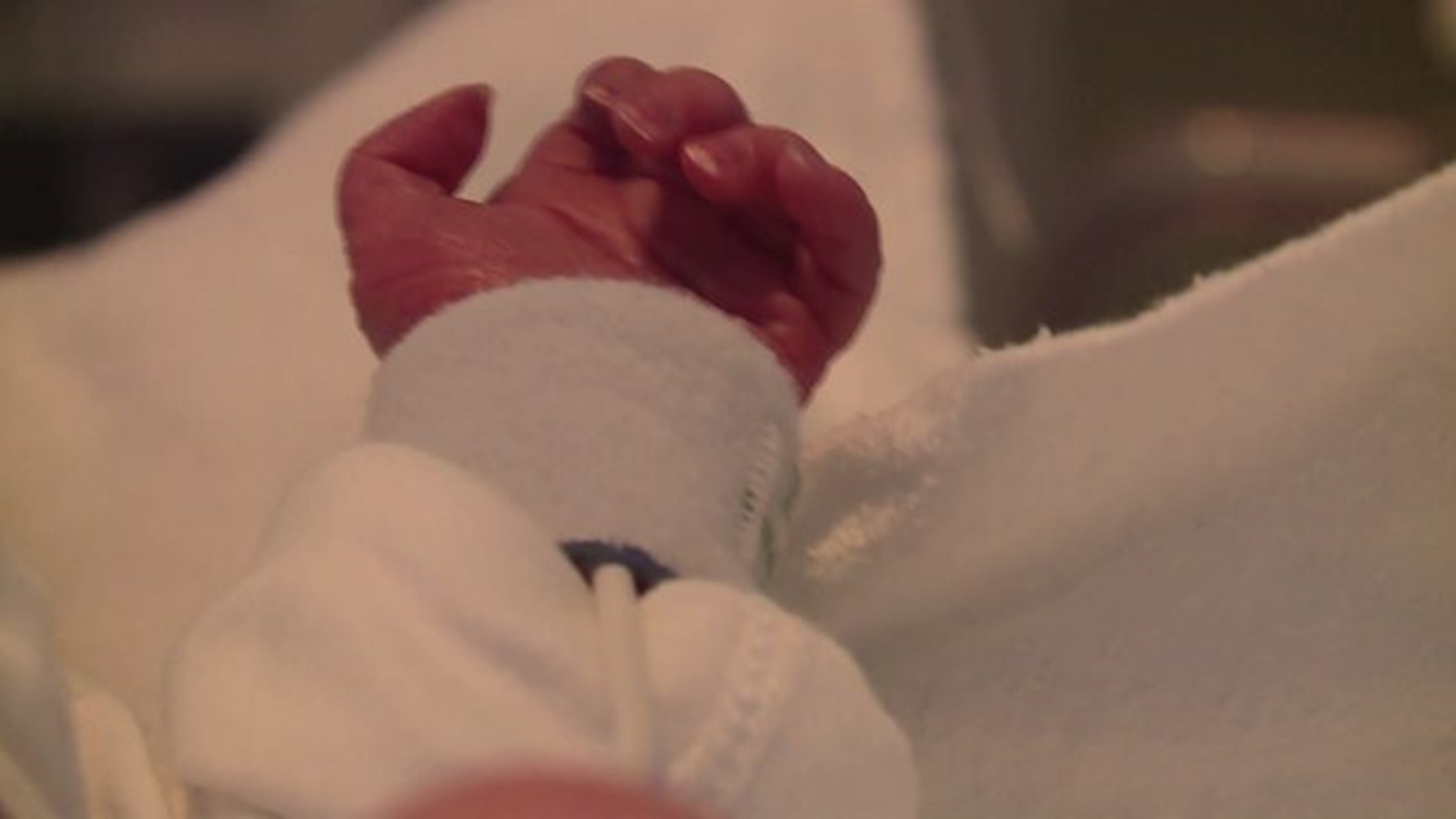HARTFORD — The impact of opioid addiction continues to grow nationally and here in Connecticut. FOX 61 received an inside look at how the youngest victims of this crisis are being impacted, as newborn babies battle withdrawal symptoms in hospitals across the state.
Infants born dependent on opioids suffer from Neonatal Abstinence Syndrome, or NAS.
The latest numbers on this issue from the state’s Department of Public Health show that 384 infants born with NAS in Connecticut in 2014. Doctors today, argue that number has grown significantly.
Nationwide, an infant is born with NAS every 25 minutes. In Connecticut, the rate of infants with NAS doubled from 2003-2014.
Infants with NAS suffer from withdrawal symptoms within their first few days of life. Each baby will have varying degrees of these symptoms, but most often include extreme irritability, tremors, seizures, trouble eating, breathing complications, and difficulty sleeping, all caused by the prescription pain medication or heroin they were exposed to while in their mother’s womb.
Nurse Terri Miffit cares for babies in the Neonatal Intensive Care Unit at Saint Francis Hospital and Medical Center. She described the cry of an infant with NAS as one that is heart wrenching and drastically different from a typical infant’s cry.
“They have just blood-curdling screams. They have an inability to be still and they can’t… they don't know what that is,” Miffitt said. “Babies that are born addicted don't have a choice in treatment and management they have to withdraw from the medication they have to withdraw from the narcotic.”
The withdrawals are often treated with morphine to keep the infant comfortable.
“Their bodies are so stressed, their nervous system has been so affected by the narcotics they don’t know how to respond in a normal way,” Miffitt said, explaining that simple tasks such as a diaper change or taking a temperature can be overstimulating and overwhelming for the baby.
In addition to what the infant is going through, some mothers of NAS babies are clouded by the shame of addiction, which means they may hide the situation from family, leaving them without a support system.
Dr. Jose Arias-Camison, the director NICU Saint Francis Hospital and Medical Center explained, “Parents usually feel guilt, you know, even somebody who is addicted to heroin will feel guilt after the baby shows signs of withdrawal. At times it’s a very complex situation, because at times the grandparents don’t know that the mother is using drugs. It’s very complicated.”
Dr. Arias-Camison said along with the emotional costs to a family, babies with NAS come with a monstrous price tag to the state.
“In 2014 the patient cost in Connecticut was close to 9 million dollars and of those 9 million dollars 80 percent is Medicaid,” Dr. Arias-Camison said.
He went on to say if a mother is addicted to heroin, prescription pain pills, other opioid substances, the newborn as a 50-75% chance of developing withdrawal symptoms, or NAS, within its first week of life. Also, that an infant with withdrawals is forced to stay in the hospital up to four times longer than a typical newborn.
“The only way to avoid that is prevention, is making the public understand that if you don’t use opiates before you are pregnant, your baby will never have signs of withdrawal,” Dr. Arias-Camison said.
Miffitt seconding that message, urging mothers dealing with addiction to seek help as soon as possible.
“If you are pregnant and you are addicted please get into a program that can support you in maintaining your health and wellness,” Miffitt said. She also reminds parents of an infant with NAS, that they are not along and that support is critical to the child’s well being and development.
“We don't judge you we hope the best for you and we hope that as for your entire family your community they can be supportive and encouraging to you,” Miffitt said.
If you or a loved one is struggling with addiction click here for ways to get help.
In a recent report put out by the U.S. Surgeon General, he writes, "We also need a cultural shift in how we think about addiction. For far too long, too many in our country have viewed addiction as a moral failing. This unfortunate stigma has created an added burden of shame that has made people with substance use disorders less likely to come forward and seek help. It has also made it more challenging to marshal the necessary investments in prevention and treatment. We must help everyone see that addiction is not a character flaw – it is a chronic illness that we must approach with the same skill and compassion with which we approach heart disease, diabetes, and cancer.”
In 2015, substance use disorders affected 20.8 million Americans—almost 8 percent of the adolescent and adult population, according the same report. That number is similar to the number of people who suffer from diabetes, and more than 1.5 times the annual prevalence of all cancers combined (14 million).

